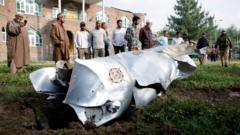Diplomatic efforts by Gulf states, particularly Saudi Arabia, are underway to ease escalating tensions between India and Pakistan, following a recent terror attack accusation by India against Pakistan.
Gulf States Take Mediation Role in Escalating India-Pakistan Conflict

Gulf States Take Mediation Role in Escalating India-Pakistan Conflict
As the India-Pakistan conflict intensifies, Saudi Arabia and the UAE are stepping in to mediate amidst global tensions.
The worsening conflict between India and Pakistan has prompted urgent intervention from Gulf states, as they strive to mediate in the face of increasing military actions and global inactivity.
Saudi Arabia and other Gulf states are ramping up diplomatic efforts to relieve escalating tensions between India and Pakistan, a situation that has been intensifying for over two weeks. The tension follows India's allegations linking Pakistan to a terror attack that occurred on April 22 in Kashmir—a disputed territory claimed by both nations. Recent airstrikes launched by India targeted locations in the Pakistani region and have raised alarms in the international community.
While calls for de-escalation are being echoed globally, the United States has refrained from stepping in, leaving Saudi Arabia to take a more proactive role. Adel al-Jubeir, Saudi Arabia’s foreign affairs minister, has engaged in face-to-face discussions with leaders from both India and Pakistan, visiting New Delhi prior to a trip to Islamabad.
Pakistani authorities have indicated ongoing discussions with ambassadors from multiple Gulf states including the UAE and Kuwait. Additionally, Iran’s foreign minister has also traveled to both nations this week as a part of the diplomatic effort.
The Gulf states are uniquely positioned as intermediaries, maintaining significant relationships with both countries. Their connections to India are enhanced by the presence of millions of Indian expatriates and a robust energy market, while Pakistan has historically relied on Saudi military collaboration since the 1960s.
In previous crises, such as in 2019 when India conducted airstrikes in response to an attack in Kashmir, both Saudi Arabia and the UAE facilitated diplomatic dialogues that quelled rising tensions. For instance, the UAE's foreign minister traveled to Islamabad and New Delhi, while Saudi Arabia arranged meetings with leaders from both sides to promote peace.
Experts suggest that Gulf nations see their role in mediation as both a means of enhancing their geopolitical influence and safeguarding their own regional security and economic interests.
Ismaeel Naar, based in Dubai, reports on these developing dynamics and their implications for peace in the region.
Saudi Arabia and other Gulf states are ramping up diplomatic efforts to relieve escalating tensions between India and Pakistan, a situation that has been intensifying for over two weeks. The tension follows India's allegations linking Pakistan to a terror attack that occurred on April 22 in Kashmir—a disputed territory claimed by both nations. Recent airstrikes launched by India targeted locations in the Pakistani region and have raised alarms in the international community.
While calls for de-escalation are being echoed globally, the United States has refrained from stepping in, leaving Saudi Arabia to take a more proactive role. Adel al-Jubeir, Saudi Arabia’s foreign affairs minister, has engaged in face-to-face discussions with leaders from both India and Pakistan, visiting New Delhi prior to a trip to Islamabad.
Pakistani authorities have indicated ongoing discussions with ambassadors from multiple Gulf states including the UAE and Kuwait. Additionally, Iran’s foreign minister has also traveled to both nations this week as a part of the diplomatic effort.
The Gulf states are uniquely positioned as intermediaries, maintaining significant relationships with both countries. Their connections to India are enhanced by the presence of millions of Indian expatriates and a robust energy market, while Pakistan has historically relied on Saudi military collaboration since the 1960s.
In previous crises, such as in 2019 when India conducted airstrikes in response to an attack in Kashmir, both Saudi Arabia and the UAE facilitated diplomatic dialogues that quelled rising tensions. For instance, the UAE's foreign minister traveled to Islamabad and New Delhi, while Saudi Arabia arranged meetings with leaders from both sides to promote peace.
Experts suggest that Gulf nations see their role in mediation as both a means of enhancing their geopolitical influence and safeguarding their own regional security and economic interests.
Ismaeel Naar, based in Dubai, reports on these developing dynamics and their implications for peace in the region.


















